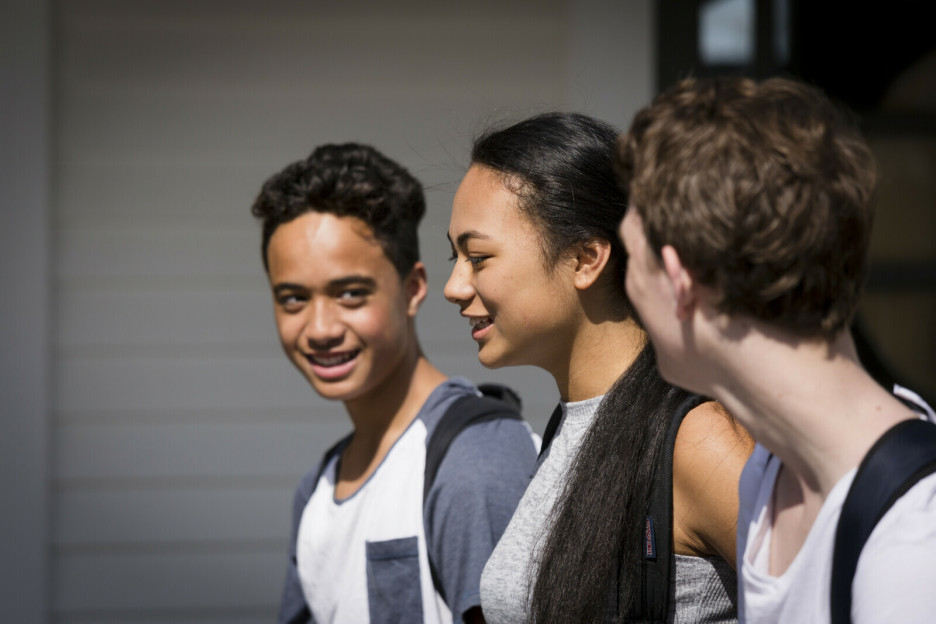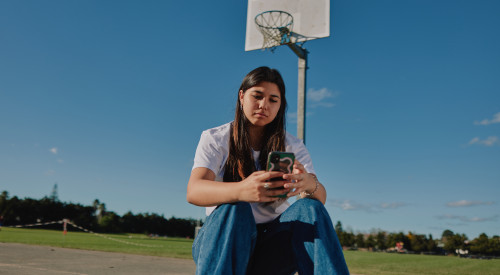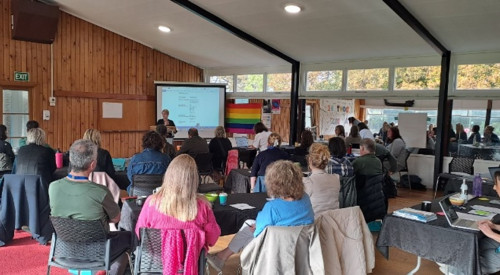Student: "Our opinions were heard and we felt good about it"
Case study 14 June 2022

This story was captured from a Tūturu case study in an evaluation by the New Zealand Council for Educational Research - read the full report.
One school took its students through the process of building graduate profiles as staff recognised they did not have a sense of what students wanted out of school.
Form time groups had recently been established at the school, and with that came the ability for students to be form time leaders of whānau groups. These student leaders started the development of the graduate profile. Tūturu facilitators visited the school and took student leaders through a workshop process to create a brainstorm of things that were important to have in the school. The process was also about growing students’ capabilities. The student leaders then workshopped their suggestions with their whānau group. That way, all students at the school took part in the process.
What were the benefits?
Before this process, students did not feel their voices were heard. Now they felt more confident. The workshopping process had been eye-opening for them as it had helped them learn how to consult and value the opinions of their classmates who weren’t in leadership roles. Students also thought that the process enabled them to learn more about their peers and become empathetic to different life experiences and points of view.
Student statements
Student A: “Listening to someone, hearing their story can tell you a lot about them. When I heard everybody speak, I was like woah I thought you were a shy person. At times even the ones I thought were ‘trouble kids’, proved me wrong. You can’t judge a book by its cover.”
Student B: “It opened my mind to different opinions in general. I might have one idea, and this person has a different one, but we can collate it all to be something even better.”
One thing that students at the school said was very important to them was the way the school made some tangible changes because of the graduate profile process. School staff then took action and gave students some of the things they asked for.
“It helped the students—made them think about themselves and what they want. I said I wanted students to have opportunities to work pathways, which we have now. It’s pretty cool,” Student C.
The process had helped the school build a stronger focus on student leadership. Staff were offering more opportunities to grow new student leaders, and students could see the shift in the school over the last few years.
Student feedback included:
“When I started, back in Year 9 … I felt that the principal looked towards the [student] leaders as he expected the leaders or more academic ones to do well. But he [also] focused more on the students who weren’t achieving well. That’s all good but there wasn’t an evenness to it. I felt left out, but then he’d come to me and ask why I wasn’t doing well enough. I was thinking of leaving but thank goodness I didn’t. Now I feel like everybody has a say, and everybody gets the chance to be a leader.”
“Often youth aren’t heard. After this experience, for me too, I feel that our opinions were able to be heard and we felt good about it. Often, back in 2016 up until some of 2018 I’d hear a lot of students complain that nobody wanted to listen to them. After this kind of experience, they listened to us and heard what they wanted to say.”
The change in students’ attitude towards the school and teachers was noticed by staff as well. A school lead explained: “I think students didn’t feel like they felt they had an entitlement for learning and entitlement to ask questions. Last year they didn’t feel like they had the right to say anything, at all […] This year we heard from ERO from a random sample of students, who are absolutely telling us what they think they’re entitled to, and what they think should happen ... we can see change.”
What’s next?
Both students and leaders identified a need to follow through with the process to properly implement the graduate profile they’d developed. Students felt that, although the process itself had been beneficial and they could see the changes the school had made as a result, they still hadn’t seen the graduate profile anywhere around the school and were waiting for something else to happen.
Overall, the graduate profile taught students to listen to one another and made them feel like their voices were heard by the school. This was noticed by teachers as well. The graduate profile process was appreciated by all who took part, and teachers considered the process was contributing to some of the wider shifts the school was making.
Recent news

What Tūturu is learning about youth gambling this Gambling Harm Awareness Week
2 September 2024
This Gambling Harm Awareness Week (2-8 September 2024), we want to highlight the health impacts gambling can have on young people, and what we want to do about it.

Supporting Students: A Wellbeing Lens – Dunedin Tūturu Whole School Approach Day 2024
2 July 2024
In May, schools from throughout Otago and staff from orgs such as Te Whatu Ora, NZ Police and MOE gathered to hear from a range of speakers on how best to meet the needs of secondary school students.
How can schools better handle student mental health and wellbeing? Insights from NZCER's secondary principals' survey
25 March 2024
In November 2023, the results of a 2022 nationwide survey of secondary school principals in Aotearoa revealed that the top issue they ranked dealing with at school was providing support for students grappling with mental health or wellbeing issues.